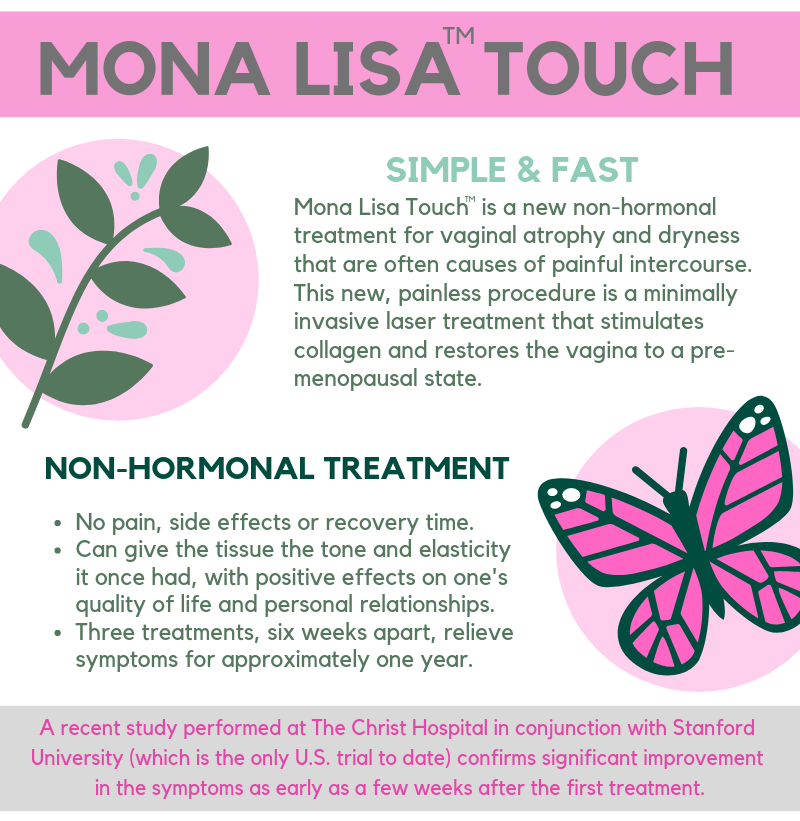Sex. It’s wonderful and lovely and joyful. Until it’s not. We all have those nights when our husbands snuggle up close and all we can think is, “Oh man. I just wanna watch the news and go to sleep.” (OK, I’m assuming we’ve all had those moments on occasion. If you haven’t, then bravo, lady! Seriously, we’re jealous and need to know your secret post-haste!)
For the rest of us, this is likely part of normal life. Still, what if it’s not normal? What if sex is neither, “Oh, YES!” or “Maybe later, honey.” but, “Oh NO! That hurts!” Pain during intercourse actually has a name. It’s called dyspareunia, and can range from mild discomfort to excruciating pain. It may burn, sting or feel sharp. Your pain may be felt on the vulva (outer genitals), deep within the vagina, or in the general pelvic area, which is most common.
Painful intercourse is a problem for many women – nearly three out of four women experience it, most commonly after menopause – and it’s time we talked about it.
Our contributors are always willing to bare (Haha. See what we did there?) their souls for the good of mamas everywhere, so we asked them to tell us where – and when – it hurts. And then, we turned to the experts, our friends at the Christ Hospital Health Network.
Let’s start with the first, most basic question.
What’s the most common cause of painful intercourse?
According to Lana Lange, MD, Obstetrician/Gynecologist at The Christ Hospital Health Network, “The most common cause of painful intercourse is changes to the vaginal canal during/after menopause. The lack of estrogen stimulation to the vaginal mucosa (skin) causes the tissue to thin and become deplete in lubrication (gets very dry). The vagina also actually shrinks in size and loses its ability to expand during sexual arousal to allow for penetration.
Other, non-menopausal causes including uterine or ovarian growths, cervical infection (STDs, bacterial vaginosis, yeast, etc), endometriosis, vaginismus, a history of sexual abuse, and pelvic floor muscle spasms.”
Other causes of painful intercourse can include:
- A childbirth-related condition
- Inherited abnormality
- Endometriosis
- Scarring from previous pelvic surgeries
- Skin disorders
- Uterine fibroids
- Vaginal atrophy (the walls of the vagina and vulva become thinner and dryer, due to a decrease in estrogen)
- Vaginismus (a spasm of the muscles of the vagina)
- Vaginitis (inflammation or infection of the vagina)
- Painful intercourse risk factors
So… childbirth-related condition. That sounds about right. One of our CMB mamas asked…
What’s the most effective way to heal following a severe tear during labor and delivery to prevent or lessen painful intercourse in the future?
According to Dr. Lange, “The vagina is very forgiving when it comes to post-delivery healing. Women typically heal well within eight weeks as the vagina has a lot of good blood flow to it and is designed to heal after delivery. However, if the tear is severe or you are having trouble healing, we will sometimes use estrogen creams or daily perineal (vaginal opening) massage to help stimulate healing and break down scar tissue, among other things.”
CMB Note: The takeaway for us is to always talk to your doctor if your recovery does not feel right! And, we know it’s cliche, but try to relax. Expecting pain to occur can make things worse. Take it sloooooow and easy.
Our next contributor tells her story…
“Because of a long and particularly painful recovery (doc did a not-so-great episiotomy) after the birth of my first, I developed vaginismus. While I am educated now, I tried to suffer through excruciating sex for a couple months (because everyone tells you to expect that) before telling my doctor. I think it’s so important for women to be told and educated that it may be more than just normal discomfort and pain postpartum. If you feel your pain is abnormal, discuss it with your doctor.”
What is vaginismus and how can it cause painful intercourse?
Vaginismus is a spasm of the vaginal muscles, typically when something is entering the vagina. It can be slightly uncomfortable or extremely painful. You might feel pain during sex or even when inserting a tampon. Doctors aren’t sure why vaginismus occurs. It’s often linked to anxiety, which make sense as we try to resume a sex life after having a baby!
What can be done about vaginismus?
Dr. Lange says, “Your doctor may reassure you or recommend additional treatments. We have many treatment options including: vaginal estrogen cream, perineal massage, revision of the episiotomy scar, pelvic floor physical therapy, referral to a specialist for trigger point injections, etc. But remember, this can be a long road and an immediate fix is the exception, not the rule!”
Next question, please! Here’s an interesting one…
“Can you be ‘allergic’ to your spouse?”
Now, now ladies, we’re not talking about being allergic to things he does that annoy you. 😉 If you’re experiencing burning or aching pain during sex, and it doesn’t have an explanation, you might wonder this. According to Dr. Lange, this is a common question!
She says, “I’m not sure if we know that answer for sure. There do seem to be couples that have problems with odors, burning or discomfort after intercourse that resolves on its own. This may be due to a difference in pH balance or normal bacteria between the couple. However, the vagina is usually able to ‘cleanse itself’ and restore the normal equilibrium for that woman. It has been shown that certain women mount an inflammatory response to much less stimuli (yeast/bacteria load) than others, but the mechanisms aren’t yet clear.
If condoms are used, it may be an allergy to the condom.”
CMB Note: No suffering in silence. If you’re having this issue, ask your doctor!
On a similar note, we want to make sure we’re keeping ourselves healthy in that region. The products we use will affect that.
Do you have specific recommendations for lubricants? Are organic lubricants better? Are there other options if a woman is irritated by condoms or lubricants?
According to Dr. Lange, “I typically recommend a water-based lubricant. The ones most commonly recommended are called Astroglide and KY Jelly. If you are menopausal or have sensitive skin, I recommend against use of any lubricant with a flavor or heating/cooling element as these typically are made with an alcohol component and can end up causing burning. I typically recommend against any specific oils or other products. Water would be OK.”
Ah ha! So if we’re not feeling adventurous in the bedroom, we can explain to our partners that it’s all about health. And if you are feeling adventurous, well, I’m sure you can figure something out! 😉
Besides what we’ve already mentioned for specific problems, our friends at The Christ Hospital Health Network can treat all kinds of issues. They’re ready to help us get back to what’s important, including a healthy physical relationship with our spouse or partner. And rest assured, the docs who treat these conditions at Christ are Women’s Health experts who can help you manage not just the condition itself, but the fear and anxiety that might go along with it. Once you understand the condition and its causes, you’ll work with your doctor to choose the best treatment option.
Treatment may include:
- Topical estrogen—applied to increase lubrication if your symptoms are related to vaginal dryness*
- Desensitization therapy—teaches relaxation exercises that may decrease pain
- Counseling—identifies issues that may be expressed as sexual problems
- Sex therapy—focuses on your physical relationship with your spouse or partner
- Treatment of any physical condition that may be causing you pain
*For women who suffer from vaginal dryness, your physician may suggest Mona Lisa Touch™, a therapy available exclusively at The Christ Hospital Health Network.
Surgery
If your physician suggests surgery for a medical cause of your painful intercourse, don’t hesitate to discuss your concerns. Fear of the unknown and lack of knowledge can sometimes mean you ignore symptoms and delay treatment.
The Christ Hospital Health Network specializes in minimally invasive surgeries using small incisions. These procedures mean you have less scarring, fewer complications, decreased pain and faster recovery. And we all know how important a quick recovery is when you have kids and a life to resume!
We’re lucky in our area to have The Christ Hospital Health Network’s Women’s Surgery Center, which is designed specifically for women. The Center features spacious operating rooms, the da Vinci surgical system for robotic-assisted gynecologic surgery (CMB Mom Note: Robot surgery? How cool is that?!), and telemedicine technology for real-time, remote consultations with pathologists.
While we always hope to avoid surgery, it helps to know that we have the best option available!

















